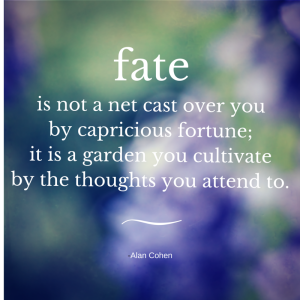 It’s nice to believe in fate, isn’t it? It’s almost reassuring in a way. After all, if fate exists, then fate can bring you your mate, your ideal job, anything that is “meant” for you. But in that same realm, fate can bring you an accident, breakup, disease, injury.
It’s nice to believe in fate, isn’t it? It’s almost reassuring in a way. After all, if fate exists, then fate can bring you your mate, your ideal job, anything that is “meant” for you. But in that same realm, fate can bring you an accident, breakup, disease, injury.
If we live at the effects of fate, we are victims to the things that happen to us. We take ourselves out of the picture. We assume we have no control. We put ourselves at the whims of others and the situation.
What if, instead of looking at fate as some pre-designed experience meant to happen to us, we look at fate as an array of options? A menu of choices that we can attend to in any way we want?
This puts the onus on us. We are in charge of our choices. We have many choices available to us. Any and each of those choices can help determine our experience.
This approach can be empowering! It can also be disconcerting. This requires of us a lot of responsibility. If we make our choices, then in turn, we make our fate. But, what if we make the wrong choice?
The responsibility and corresponding worry is enough to make you paralyzed with fear. It may stop you dead in your tracks and render you unable to choose. And if you don’t choose, life chooses for you. (After all, choosing not to choose is still making a choice.)
Now don’t get me wrong, I’m not saying this means that all of the choices will be lovely desirable ones. Life happens. Shit happens. And sometimes, it happens to us and those around us. How we deal with it and what we make of it, is a choice.
The first step in seeing this new perspective is allowing ourselves to see it. Opening our mind up to possibilities. Recognizing that these are paths, and like the choose your own story books, these paths can lead to different experiences, and sometimes even end up in the same place.
We can’t control everything. We can’t control the person who hits our car, breaks up with us, or fires us. We may see this as “fate,” but that doesn’t mean we are victims to it. In fact, we can cultivate a whole new outcome by choosing our response. We can choose our optimal response when we learn to choose our thoughts. (More on choosing your thoughts soon…)

